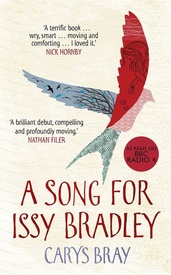Review of A Song For Issy Bradley

When she takes to her bed – or, rather, her deceased daughter’s small bunkbed – her husband feels both embarrassed and confused: his church has no place for grief. Meanwhile, the three remaining children are deprived of the parental attention they so desperately need. The youngest, Jacob conducts experiments with dead birds and insects to pave the way for the miracle that will bring back his sister:
‘Dear Heavenly Father. I have faith that you can resurrect the bird. This is a real prayer. It’s not like asking for a bike or something, it’s important. When you resurrect the bird, I will have even more faith. And then there can be even better miracles. In the name of Jesus Christ, Amen.’ (p134)
Alma struggles to balance his own aspirations with his immersion in a culture that portrays his beloved football as an irrelevant distraction while grooming him for the obligatory two years as a missionary when he leaves school at eighteen. Meanwhile, love-struck Ziggy prepares for her gender-determined future role as homemaker in a bizarre ceremony in which teenage girls parade in their mothers’ wedding dresses and write shopping lists for their ideal husbands.
A Song for Issy Bradley is a moving and unexpectedly amusing portrayal of bereavement and religious belief that I can wholeheartedly recommend. Thanks to Charlotte Bush at Hutchinson for my review copy. Thanks also to the author for submitting to my debut novelist Q&A – do pop along there for an insight into her writing process, her feelings for her characters and writing from her own experience.
Finding Fiction in the Cracks
Claire has married Ian, not because he’s the person who can make her most herself, but because his religion means he’ll never leave her the way her father left her mother. Ian cannot envisage that she would have opinions of her own, independent of the diktats of their creed:
‘We don’t do this, Claire.’
‘Don’t tell me what “we” do.’
‘Well, we don’t.’
‘I want to.’
‘We concentrate on the resurrection. That’s why we don’t have crosses everywhere. I shouldn’t have to tell you, you know this – the empty tomb, that’s what we think about, not the body left behind.’
‘Stop telling me what to do.’
‘I’m not, I’m trying to explain –‘ (p158)
The unforeseen death of their youngest child brings out the cracks in their marriage and in the religion that has otherwise sustained them. Claire discovers that some emotions cannot be contained within the Mormon church.
Everyday life is full of cracks that have been papered over, weaknesses and gaps in ourselves and our situations that circumstances enable us to ignore. It turns into a story when those cracks begin to show. The story develops through the widening of the cracks until a crisis point is reached and something has to give. The crack might arise through a mismatch between what a character wants and what the world can deliver, but it doesn’t have to be so.
Crack FlashBefore I go off to look for more fiction in the cracks, I’ll leave you with Leonard Cohen’s “Anthem” which has a great line about cracks ... and my response to Charli’s latest flash fiction challenge: | |
So much time she’s wasted alone in bed staring at the cracks in ceiling. Dreaming, not thinking, not daring to wonder why her man was so late home.
Thanks for reading. I look forward to your comments on any aspect of this post.





















 RSS Feed
RSS Feed





















